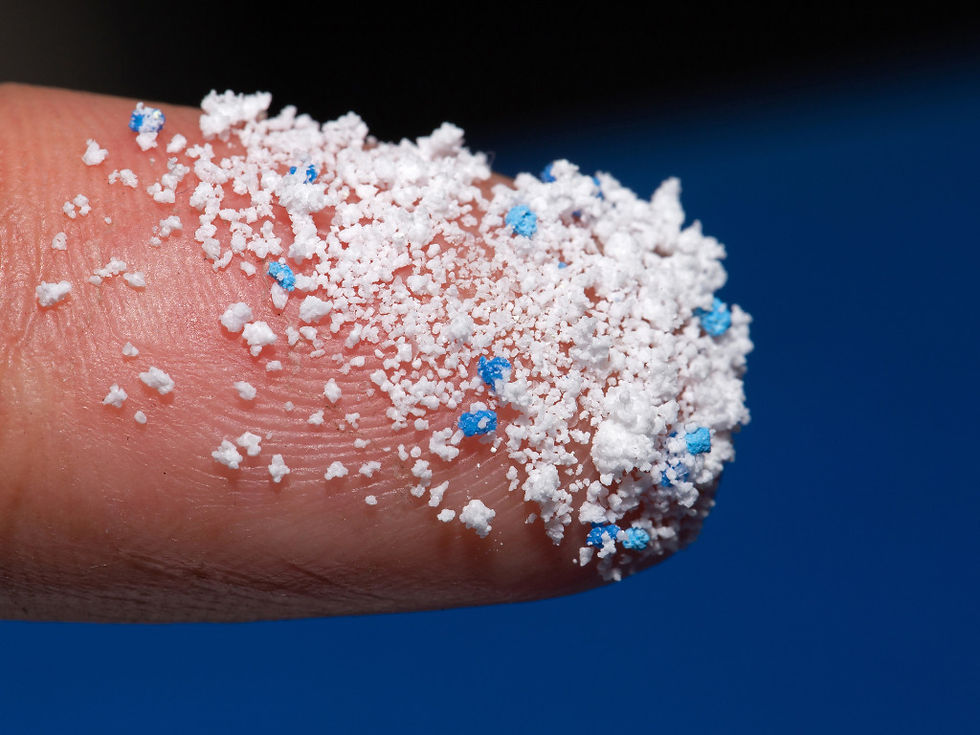Micro-Plastics: The Invisible Threat Hiding in Plain Sight in our Society.
- Quit Plastic
- Oct 1, 2024
- 3 min read
Updated: Feb 13

Microplastics may be invisible to the naked eye, but their impact on our planet is colossal. These minuscule Plastic fragments, less than 5 millimetres in diameter, are infiltrating every corner of the environment, from the pristine peaks of the Himalayas to the deepest trenches of the Mariana Trench. Quit Plastic sheds light on this invisible threat and empowers you to be part of the solution.
A Multifaceted Problem with Devastating Consequences
Microplastics don't discriminate in their origins. They come from many sources, both deliberately manufactured (primary microplastics) and from the breakdown of larger plastic items (secondary microplastics). Primary microplastics are prevalent in facial scrubs, synthetic clothing like fleece, and kinds of toothpaste.
Secondary microplastics are designed to be small, but their minuscule size allows them to escape wastewater treatment plants and enter our waterways quickly. They originate from degrading Plastic bottles, bags, and other single-use plastics that litter our landscapes. Sunlight and environmental factors break down these larger plastic items into ever-smaller fragments, creating a pervasive and persistent ecological threat.
These minuscule particles are efficiently washed into storm drains and rivers, ultimately ending up in our oceans. Marine animals, from the tiniest plankton to the majestic whales, often mistake microplastics for food due to their resemblance to natural prey like zooplankton.
This leads to blockages in their digestive tracts, causing them to starve or even die. Microplastics disrupt the delicate food chain in the ocean, potentially impacting human health. Microplastics can bioaccumulate in our seafood, raising concerns about the long-term effects on our well-being.
Beyond the Ocean: A Threat Lurking Everywhere
The issue of microplastics extends far beyond the confines of our oceans. Studies have detected microplastics in everything from bottled water and table salt to honey and beer. The potential health risks associated with microplastic ingestion are still under investigation, but the long-term implications are concerning. Research suggests that microplastics may disrupt hormone function, cause inflammation, and even lead to certain cancers. The sheer ubiquity of microplastics in our environment necessitates further study and a proactive approach to mitigate this growing threat.
A Call to Action: Be the Ripple Effect in a Sea of Change
While the microplastic problem seems overwhelming, there is hope. By reducing our reliance on single-use plastics and making informed choices about the products we purchase, we can significantly impact the amount of plastic entering the environment. Here are some actionable steps you can take to make a difference:
Embrace reusables: Ditch single-use plastics by carrying a reusable water bottle, shopping bag, and coffee cup. Opt for bar soap or shower gel in place of plastic-bottled products. Invest in a reusable safety razor or menstrual cup to minimize plastic waste in your daily routine.
Seek natural alternatives: Look for personal care products free of microplastics, such as those labelled "natural" or "eco-friendly." Scrubs from ground nuts or seeds are a fantastic alternative to plastic microbead-laden exfoliants. Choose natural fibre clothing like cotton or hemp over synthetic fabrics that shed microplastics during washing.
Support sustainable brands: Research companies actively reduce their plastic footprint and use recycled materials in their packaging. Look for certifications like "Ocean Friendly" or "Plastic Neutral" when making purchasing decisions. Advocate for businesses to adopt refillable or reusable packaging options for their products.
Become an advocate: Educate your friends, family, and community about the dangers of microplastics. Share informative articles and social media posts to raise awareness. Organize beach cleanups or participate in local environmental initiatives. Lobby your local representatives to enact policies that curb single-use plastic use and promote responsible waste management practices.
Together, we can turn the tide on microplastics!
Quit Plastic is dedicated to working towards a world free from plastic pollution. Every action you take, no matter how small, contributes to a cleaner and healthier future for our planet. Let's join forces to create a wave of change and protect our oceans, wildlife, and ourselves from the invisible threat of microplastics.
Quit Plastic: Working for a Plastic-Free Future

Comments